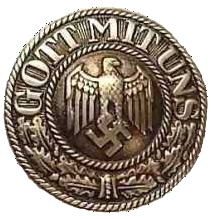Reich and directed their anger towards Berlin and Prussia, all the more because in certain quarters (the Bavarian Government) nothing was done to correct this attitude, but it was even welcomed with silent rubbing of hands.
The Jew was far too shrewd not to understand that the infamous campaign which he had organized, under the cloak of War Companies, for plundering the German nation would and must eventually arouse opposition. As long as that opposition did not spring directly at his own throat he had no reason to be afraid. Hence he decided that the best way of forestalling an outbreak on the part of the enraged and desperate masses would be to inflame their wrath and at the same time give it another outlet.
Let Bavaria quarrel as much as it liked with Prussia and Prussia with Bavaria. The more, the merrier. This bitter strife between the two states assured peace to the Jew. Thus public attention was completely diverted from the international maggot in the body of the nation; indeed, he seemed to have been forgotten. Then when there came a danger that level-headed people, of whom there are many to be found also in Bavaria, would advise a little more reserve and a more judicious evaluation of things, thus calming the rage against Prussia, all the Jew had to do in Berlin was to stage a new provocation and await results. Every time that was done all those who had profiteered out of the conflict between North and South filled their lungs and again fanned the flame of indignation until it became a blaze.
It was a shrewd and expert manoeuvre on the part of the Jew, to set the different branches of the German people quarrelling with one another, so that their attention would be turned away from himself and he could plunder them all the more completely.
Then came the Revolution.
Until the year 1918, or rather until the November of that year, the average German citizen, particularly the less educated lower middle-class and the workers, did not rightly understand what was happening and did not realize what must be the inevitable consequences, especially for Bavaria, of this internecine strife between the branches of the German people; but at least those sections which called themselves 'National' ought to have clearly perceived these consequences on the day that the Revolution broke out. For the moment the coup d'etat had succeeded, the leader and organizer of the Revolution in Bavaria put himself forward as the defender of 'Bavarian' interests. The international Jew, Kurt Eisner, began to play off Bavaria against Prussia. This Oriental was just about the last person in the world that could be pointed to as the logical defender of Bavarian interests. In his trade as newspaper reporter he had wandered from place to place all over Germany and to him it was a matter of sheer indifference whether Bavaria or any other particular part of God's whole world continued to exist.
In deliberately giving the revolutionary rising in Bavaria the character of an offensive against Prussia, Kurt Eisner was not acting in the slightest degree from the standpoint of Bavarian interests, but merely as the commissioned representative of Jewry. He exploited existing instincts and antipathies in Bavaria as a means which would help to make the dismemberment of Germany all the more easy. When once dismembered, the Reich would fall an easy prey to Bolshevism.
The tactics employed by him were continued for a time after his death. The Marxists, who had always derided and exploited the individual German states and their princes, now suddenly appealed, as an 'Independent Party' to those sentiments and instincts which had their strongest roots in the families of the reigning princes and the individual states.
The fight waged by the Bavarian Soviet Republic against the military contingents that were sent to free Bavaria from its grasp was represented by the Marxist propagandists as first of all the 'Struggle of the Bavarian Worker' against 'Prussian Militarism.' This explains why it was that the suppression of the Soviet Republic in Munich did not have the same effect there as in the other German districts. Instead of recalling the masses to a sense of reason, it led to increased bitterness and anger against Prussia.














